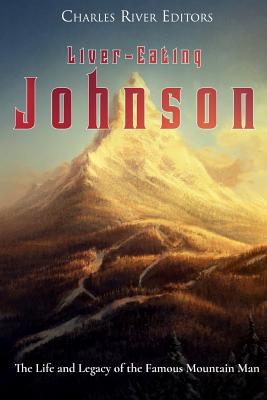Liver-Eating Johnson: The Life and Legacy of the Famous Mountain Man

Liver-Eating Johnson: The Life and Legacy of the Famous Mountain Man
*Includes pictures
*Includes online resources and a bibliography for further reading
To possess and develop western North America became a high priority for the United States government even before its constitution had been complete. For President Thomas Jefferson, the vast terrain of plains, mountains, and extensive coastlines offered both long-term prosperity and protection from competing international powers. To take ownership of the continent's natural resources and establish ports on both coasts from which to trade products with the world was alluring to several European powers as well. Spain contested the land to the south, following exploration of present-day Florida, and France was heavily invested in what was to become large tracts of eastern Canada. Britain was eager to erect forts and trading posts along the Pacific, thanks to the earlier efforts of Captain John Cooke, who had explored much of the Pacific coast. Early in the 19th-century, crossings such as the Lewis and Clark Expedition and John Jacob Astor's first business ventures in the Northwest demonstrated the impracticality of traversing the hostile environment for the common citizen but solidified Jefferson's claim on the land. Railroads were still some decades off, and passable roads were all but non-existent. From its first interactions with numerous Indian cultures, the government understood that the western portion of the continent was already "owned" by a variety of indigenous tribes, despite their alternate concept of ownership. To gain possession of the coasts and the interior meant there would be new languages to be learned, hundreds of treaties to be struck, and wars to be fought over several regions. No familiar institutions of power were suitable for creating a foothold in the continent's interior, especially in the Rocky Mountain region. The U.S. Army eventually made inroads to the Great Plains and beyond, but the first true explorers of the far west's interior arose from within a relatively small culture embodied by the American mountain man.
By the golden age of the mountain man in the mid-19th-century, there were perhaps only 3,000 living in the West. Their origins were disparate, although they included many Anglo-Americans. A good number hailed from wilderness regions of Kentucky and Virginia and throughout the newly purchased Louisiana Territory, which occupied the entire central section of the continent. French Canadians traveled from the north to wor
PRP: 79.36 Lei
Acesta este Prețul Recomandat de Producător. Prețul de vânzare al produsului este afișat mai jos.
71.42Lei
71.42Lei
79.36 LeiLivrare in 2-4 saptamani
Descrierea produsului
*Includes pictures
*Includes online resources and a bibliography for further reading
To possess and develop western North America became a high priority for the United States government even before its constitution had been complete. For President Thomas Jefferson, the vast terrain of plains, mountains, and extensive coastlines offered both long-term prosperity and protection from competing international powers. To take ownership of the continent's natural resources and establish ports on both coasts from which to trade products with the world was alluring to several European powers as well. Spain contested the land to the south, following exploration of present-day Florida, and France was heavily invested in what was to become large tracts of eastern Canada. Britain was eager to erect forts and trading posts along the Pacific, thanks to the earlier efforts of Captain John Cooke, who had explored much of the Pacific coast. Early in the 19th-century, crossings such as the Lewis and Clark Expedition and John Jacob Astor's first business ventures in the Northwest demonstrated the impracticality of traversing the hostile environment for the common citizen but solidified Jefferson's claim on the land. Railroads were still some decades off, and passable roads were all but non-existent. From its first interactions with numerous Indian cultures, the government understood that the western portion of the continent was already "owned" by a variety of indigenous tribes, despite their alternate concept of ownership. To gain possession of the coasts and the interior meant there would be new languages to be learned, hundreds of treaties to be struck, and wars to be fought over several regions. No familiar institutions of power were suitable for creating a foothold in the continent's interior, especially in the Rocky Mountain region. The U.S. Army eventually made inroads to the Great Plains and beyond, but the first true explorers of the far west's interior arose from within a relatively small culture embodied by the American mountain man.
By the golden age of the mountain man in the mid-19th-century, there were perhaps only 3,000 living in the West. Their origins were disparate, although they included many Anglo-Americans. A good number hailed from wilderness regions of Kentucky and Virginia and throughout the newly purchased Louisiana Territory, which occupied the entire central section of the continent. French Canadians traveled from the north to wor
Detaliile produsului










